University Assignment: Personal Development Plan and Weekly Journal
VerifiedAdded on 2023/05/30
|10
|2210
|168
Journal and Reflective Writing
AI Summary
This document presents a student's personal development plan and weekly journal entries. The plan includes a personal analysis of strengths, areas for development, opportunities, and threats, followed by short, medium, and long-term goals related to education, career, and personal well-being. The weekly journal entries cover topics discussed in a module, such as plagiarism, reflective thinking, academic writing, presentation skills, and library use. Key concepts like Kolb's learning cycle, academic writing styles, paragraph structure, and referencing are explored. The journal also reflects on challenges and learning experiences encountered during the module. Desklib provides access to similar past papers and solved assignments for students.
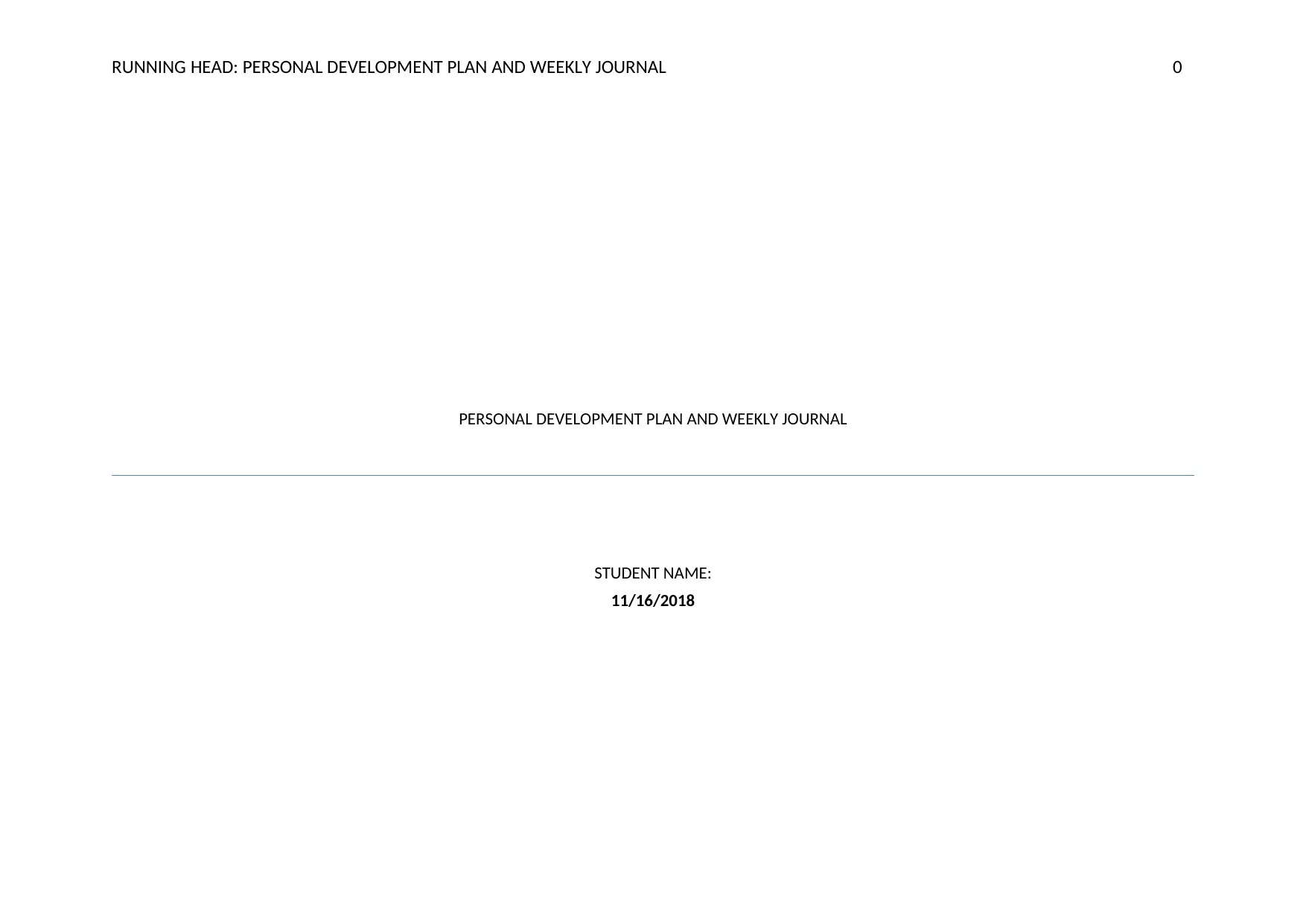
RUNNING HEAD: PERSONAL DEVELOPMENT PLAN AND WEEKLY JOURNAL 0
PERSONAL DEVELOPMENT PLAN AND WEEKLY JOURNAL
STUDENT NAME:
11/16/2018
PERSONAL DEVELOPMENT PLAN AND WEEKLY JOURNAL
STUDENT NAME:
11/16/2018
Paraphrase This Document
Need a fresh take? Get an instant paraphrase of this document with our AI Paraphraser
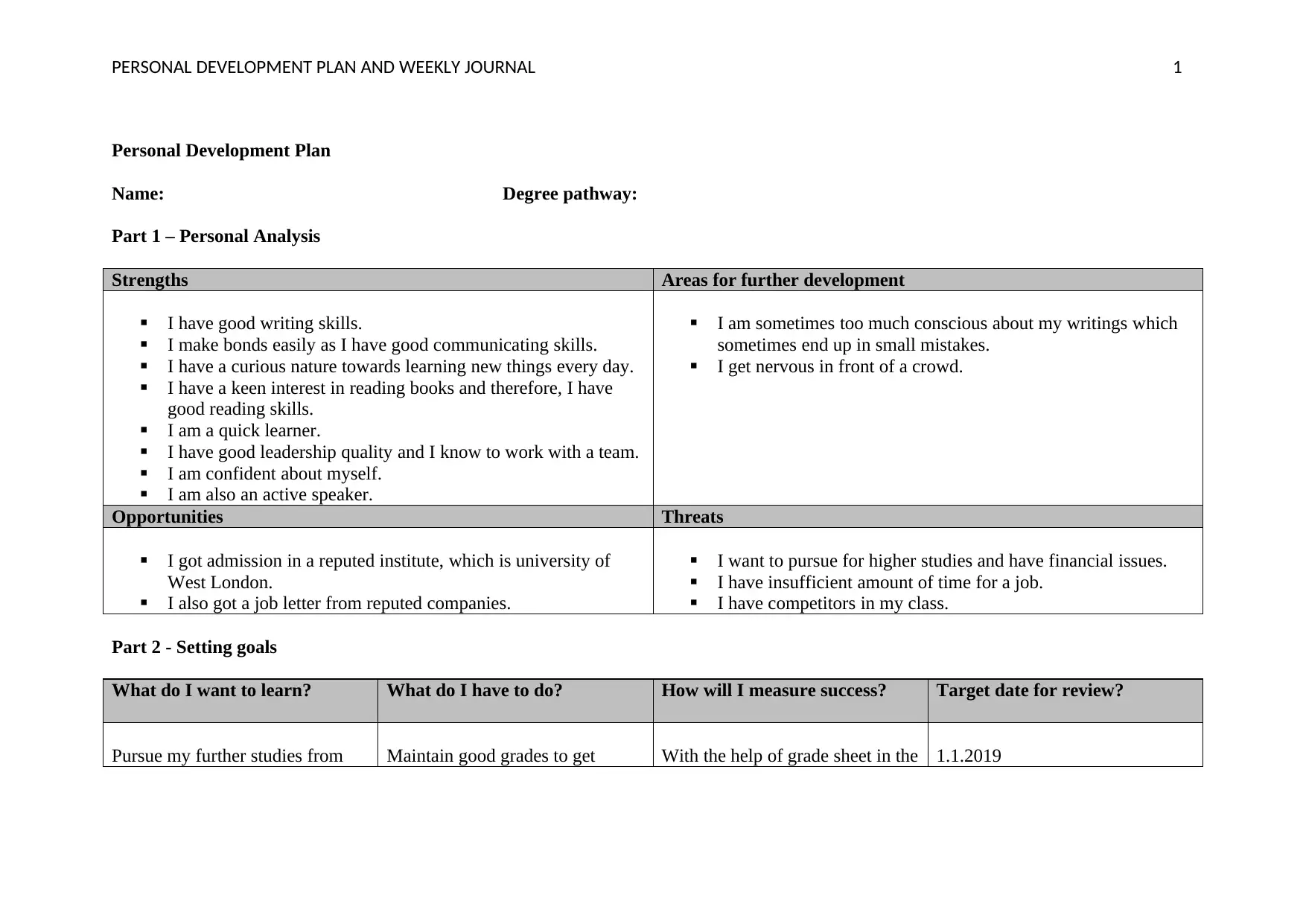
PERSONAL DEVELOPMENT PLAN AND WEEKLY JOURNAL 1
Personal Development Plan
Name: Degree pathway:
Part 1 – Personal Analysis
Strengths Areas for further development
I have good writing skills.
I make bonds easily as I have good communicating skills.
I have a curious nature towards learning new things every day.
I have a keen interest in reading books and therefore, I have
good reading skills.
I am a quick learner.
I have good leadership quality and I know to work with a team.
I am confident about myself.
I am also an active speaker.
I am sometimes too much conscious about my writings which
sometimes end up in small mistakes.
I get nervous in front of a crowd.
Opportunities Threats
I got admission in a reputed institute, which is university of
West London.
I also got a job letter from reputed companies.
I want to pursue for higher studies and have financial issues.
I have insufficient amount of time for a job.
I have competitors in my class.
Part 2 - Setting goals
What do I want to learn? What do I have to do? How will I measure success? Target date for review?
Pursue my further studies from Maintain good grades to get With the help of grade sheet in the 1.1.2019
Personal Development Plan
Name: Degree pathway:
Part 1 – Personal Analysis
Strengths Areas for further development
I have good writing skills.
I make bonds easily as I have good communicating skills.
I have a curious nature towards learning new things every day.
I have a keen interest in reading books and therefore, I have
good reading skills.
I am a quick learner.
I have good leadership quality and I know to work with a team.
I am confident about myself.
I am also an active speaker.
I am sometimes too much conscious about my writings which
sometimes end up in small mistakes.
I get nervous in front of a crowd.
Opportunities Threats
I got admission in a reputed institute, which is university of
West London.
I also got a job letter from reputed companies.
I want to pursue for higher studies and have financial issues.
I have insufficient amount of time for a job.
I have competitors in my class.
Part 2 - Setting goals
What do I want to learn? What do I have to do? How will I measure success? Target date for review?
Pursue my further studies from Maintain good grades to get With the help of grade sheet in the 1.1.2019
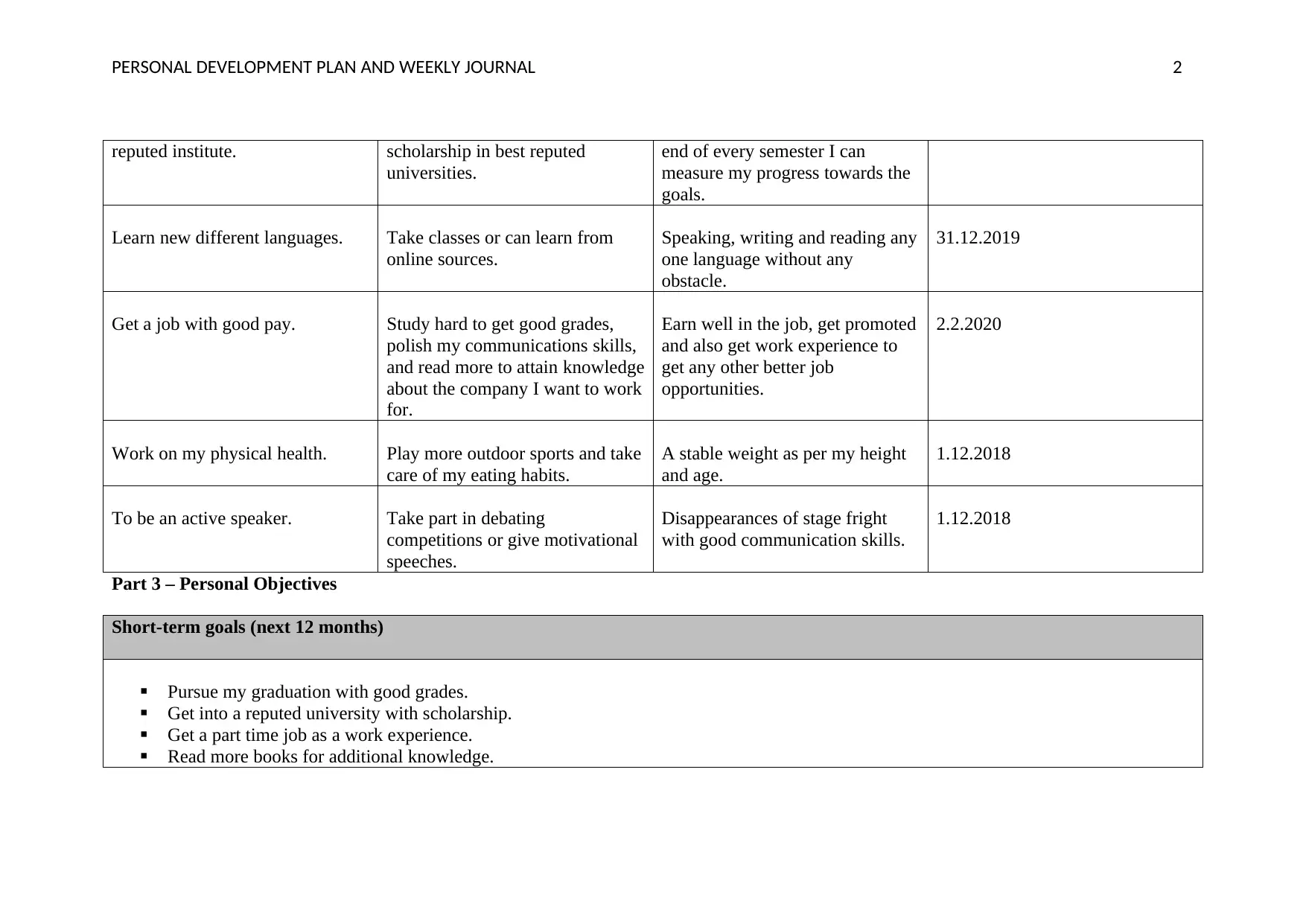
PERSONAL DEVELOPMENT PLAN AND WEEKLY JOURNAL 2
reputed institute. scholarship in best reputed
universities.
end of every semester I can
measure my progress towards the
goals.
Learn new different languages. Take classes or can learn from
online sources.
Speaking, writing and reading any
one language without any
obstacle.
31.12.2019
Get a job with good pay. Study hard to get good grades,
polish my communications skills,
and read more to attain knowledge
about the company I want to work
for.
Earn well in the job, get promoted
and also get work experience to
get any other better job
opportunities.
2.2.2020
Work on my physical health. Play more outdoor sports and take
care of my eating habits.
A stable weight as per my height
and age.
1.12.2018
To be an active speaker. Take part in debating
competitions or give motivational
speeches.
Disappearances of stage fright
with good communication skills.
1.12.2018
Part 3 – Personal Objectives
Short-term goals (next 12 months)
Pursue my graduation with good grades.
Get into a reputed university with scholarship.
Get a part time job as a work experience.
Read more books for additional knowledge.
reputed institute. scholarship in best reputed
universities.
end of every semester I can
measure my progress towards the
goals.
Learn new different languages. Take classes or can learn from
online sources.
Speaking, writing and reading any
one language without any
obstacle.
31.12.2019
Get a job with good pay. Study hard to get good grades,
polish my communications skills,
and read more to attain knowledge
about the company I want to work
for.
Earn well in the job, get promoted
and also get work experience to
get any other better job
opportunities.
2.2.2020
Work on my physical health. Play more outdoor sports and take
care of my eating habits.
A stable weight as per my height
and age.
1.12.2018
To be an active speaker. Take part in debating
competitions or give motivational
speeches.
Disappearances of stage fright
with good communication skills.
1.12.2018
Part 3 – Personal Objectives
Short-term goals (next 12 months)
Pursue my graduation with good grades.
Get into a reputed university with scholarship.
Get a part time job as a work experience.
Read more books for additional knowledge.
⊘ This is a preview!⊘
Do you want full access?
Subscribe today to unlock all pages.

Trusted by 1+ million students worldwide
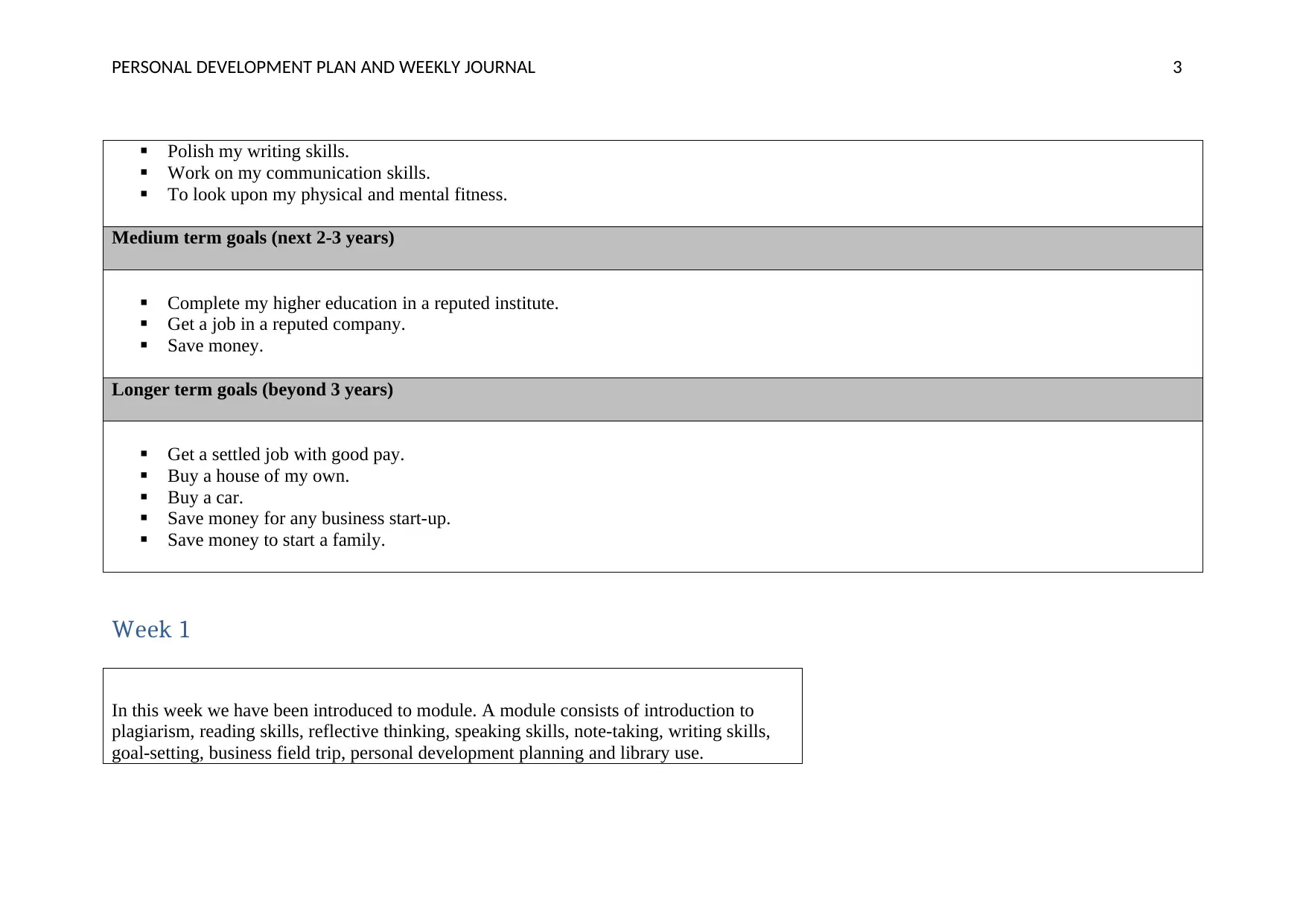
PERSONAL DEVELOPMENT PLAN AND WEEKLY JOURNAL 3
Polish my writing skills.
Work on my communication skills.
To look upon my physical and mental fitness.
Medium term goals (next 2-3 years)
Complete my higher education in a reputed institute.
Get a job in a reputed company.
Save money.
Longer term goals (beyond 3 years)
Get a settled job with good pay.
Buy a house of my own.
Buy a car.
Save money for any business start-up.
Save money to start a family.
Week 1
In this week we have been introduced to module. A module consists of introduction to
plagiarism, reading skills, reflective thinking, speaking skills, note-taking, writing skills,
goal-setting, business field trip, personal development planning and library use.
Polish my writing skills.
Work on my communication skills.
To look upon my physical and mental fitness.
Medium term goals (next 2-3 years)
Complete my higher education in a reputed institute.
Get a job in a reputed company.
Save money.
Longer term goals (beyond 3 years)
Get a settled job with good pay.
Buy a house of my own.
Buy a car.
Save money for any business start-up.
Save money to start a family.
Week 1
In this week we have been introduced to module. A module consists of introduction to
plagiarism, reading skills, reflective thinking, speaking skills, note-taking, writing skills,
goal-setting, business field trip, personal development planning and library use.
Paraphrase This Document
Need a fresh take? Get an instant paraphrase of this document with our AI Paraphraser
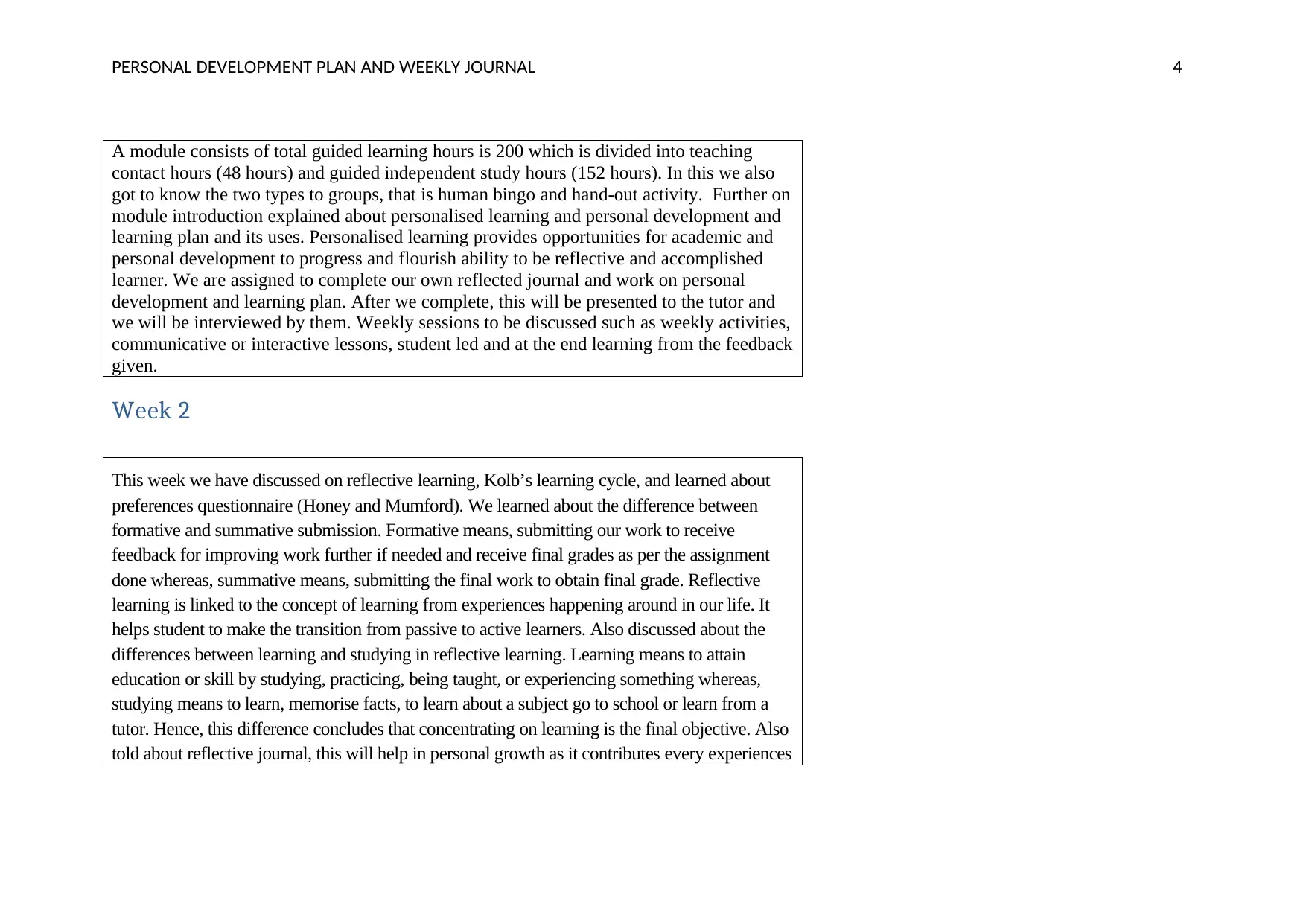
PERSONAL DEVELOPMENT PLAN AND WEEKLY JOURNAL 4
A module consists of total guided learning hours is 200 which is divided into teaching
contact hours (48 hours) and guided independent study hours (152 hours). In this we also
got to know the two types to groups, that is human bingo and hand-out activity. Further on
module introduction explained about personalised learning and personal development and
learning plan and its uses. Personalised learning provides opportunities for academic and
personal development to progress and flourish ability to be reflective and accomplished
learner. We are assigned to complete our own reflected journal and work on personal
development and learning plan. After we complete, this will be presented to the tutor and
we will be interviewed by them. Weekly sessions to be discussed such as weekly activities,
communicative or interactive lessons, student led and at the end learning from the feedback
given.
Week 2
This week we have discussed on reflective learning, Kolb’s learning cycle, and learned about
preferences questionnaire (Honey and Mumford). We learned about the difference between
formative and summative submission. Formative means, submitting our work to receive
feedback for improving work further if needed and receive final grades as per the assignment
done whereas, summative means, submitting the final work to obtain final grade. Reflective
learning is linked to the concept of learning from experiences happening around in our life. It
helps student to make the transition from passive to active learners. Also discussed about the
differences between learning and studying in reflective learning. Learning means to attain
education or skill by studying, practicing, being taught, or experiencing something whereas,
studying means to learn, memorise facts, to learn about a subject go to school or learn from a
tutor. Hence, this difference concludes that concentrating on learning is the final objective. Also
told about reflective journal, this will help in personal growth as it contributes every experiences
A module consists of total guided learning hours is 200 which is divided into teaching
contact hours (48 hours) and guided independent study hours (152 hours). In this we also
got to know the two types to groups, that is human bingo and hand-out activity. Further on
module introduction explained about personalised learning and personal development and
learning plan and its uses. Personalised learning provides opportunities for academic and
personal development to progress and flourish ability to be reflective and accomplished
learner. We are assigned to complete our own reflected journal and work on personal
development and learning plan. After we complete, this will be presented to the tutor and
we will be interviewed by them. Weekly sessions to be discussed such as weekly activities,
communicative or interactive lessons, student led and at the end learning from the feedback
given.
Week 2
This week we have discussed on reflective learning, Kolb’s learning cycle, and learned about
preferences questionnaire (Honey and Mumford). We learned about the difference between
formative and summative submission. Formative means, submitting our work to receive
feedback for improving work further if needed and receive final grades as per the assignment
done whereas, summative means, submitting the final work to obtain final grade. Reflective
learning is linked to the concept of learning from experiences happening around in our life. It
helps student to make the transition from passive to active learners. Also discussed about the
differences between learning and studying in reflective learning. Learning means to attain
education or skill by studying, practicing, being taught, or experiencing something whereas,
studying means to learn, memorise facts, to learn about a subject go to school or learn from a
tutor. Hence, this difference concludes that concentrating on learning is the final objective. Also
told about reflective journal, this will help in personal growth as it contributes every experiences
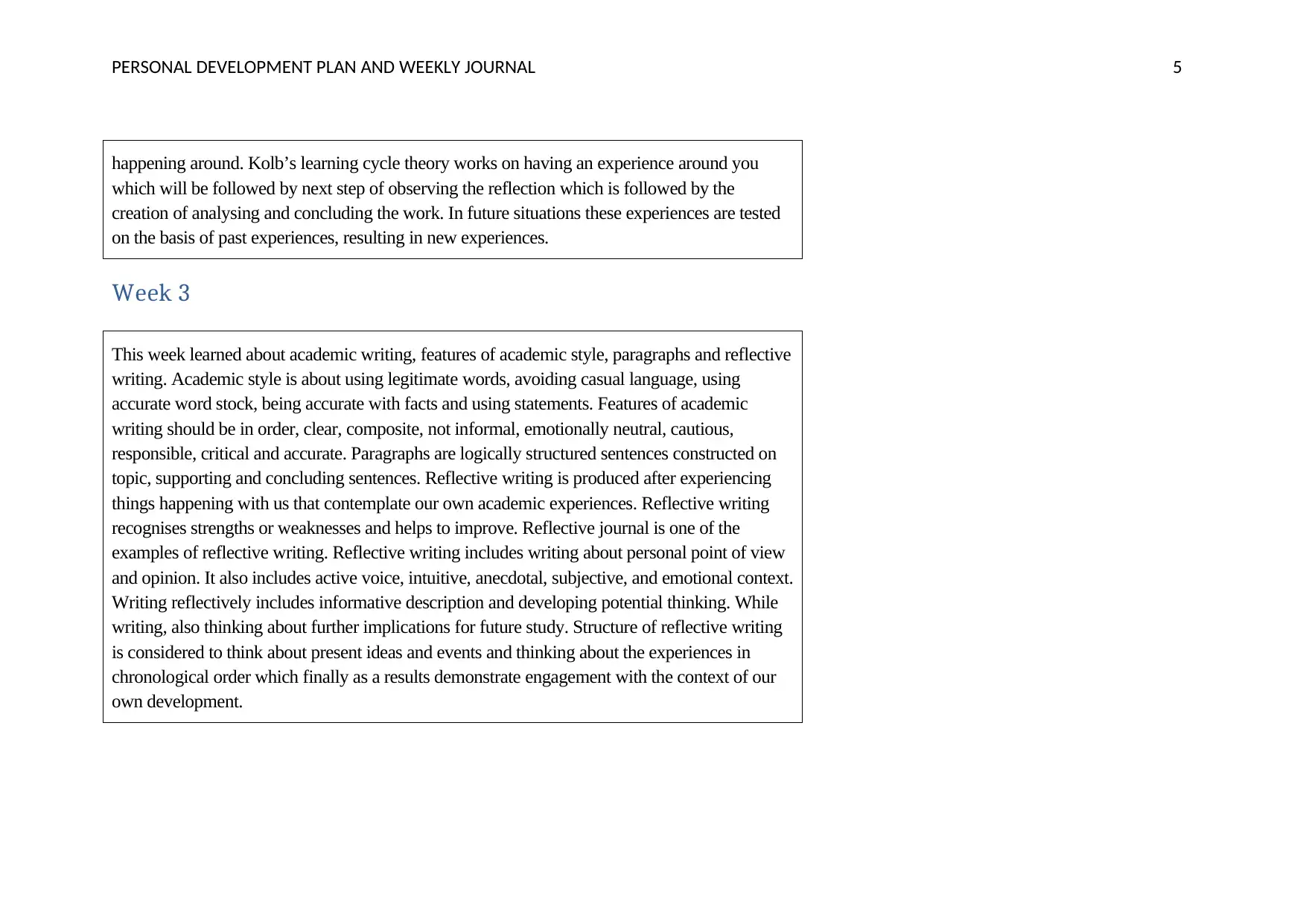
PERSONAL DEVELOPMENT PLAN AND WEEKLY JOURNAL 5
happening around. Kolb’s learning cycle theory works on having an experience around you
which will be followed by next step of observing the reflection which is followed by the
creation of analysing and concluding the work. In future situations these experiences are tested
on the basis of past experiences, resulting in new experiences.
Week 3
This week learned about academic writing, features of academic style, paragraphs and reflective
writing. Academic style is about using legitimate words, avoiding casual language, using
accurate word stock, being accurate with facts and using statements. Features of academic
writing should be in order, clear, composite, not informal, emotionally neutral, cautious,
responsible, critical and accurate. Paragraphs are logically structured sentences constructed on
topic, supporting and concluding sentences. Reflective writing is produced after experiencing
things happening with us that contemplate our own academic experiences. Reflective writing
recognises strengths or weaknesses and helps to improve. Reflective journal is one of the
examples of reflective writing. Reflective writing includes writing about personal point of view
and opinion. It also includes active voice, intuitive, anecdotal, subjective, and emotional context.
Writing reflectively includes informative description and developing potential thinking. While
writing, also thinking about further implications for future study. Structure of reflective writing
is considered to think about present ideas and events and thinking about the experiences in
chronological order which finally as a results demonstrate engagement with the context of our
own development.
happening around. Kolb’s learning cycle theory works on having an experience around you
which will be followed by next step of observing the reflection which is followed by the
creation of analysing and concluding the work. In future situations these experiences are tested
on the basis of past experiences, resulting in new experiences.
Week 3
This week learned about academic writing, features of academic style, paragraphs and reflective
writing. Academic style is about using legitimate words, avoiding casual language, using
accurate word stock, being accurate with facts and using statements. Features of academic
writing should be in order, clear, composite, not informal, emotionally neutral, cautious,
responsible, critical and accurate. Paragraphs are logically structured sentences constructed on
topic, supporting and concluding sentences. Reflective writing is produced after experiencing
things happening with us that contemplate our own academic experiences. Reflective writing
recognises strengths or weaknesses and helps to improve. Reflective journal is one of the
examples of reflective writing. Reflective writing includes writing about personal point of view
and opinion. It also includes active voice, intuitive, anecdotal, subjective, and emotional context.
Writing reflectively includes informative description and developing potential thinking. While
writing, also thinking about further implications for future study. Structure of reflective writing
is considered to think about present ideas and events and thinking about the experiences in
chronological order which finally as a results demonstrate engagement with the context of our
own development.
⊘ This is a preview!⊘
Do you want full access?
Subscribe today to unlock all pages.

Trusted by 1+ million students worldwide
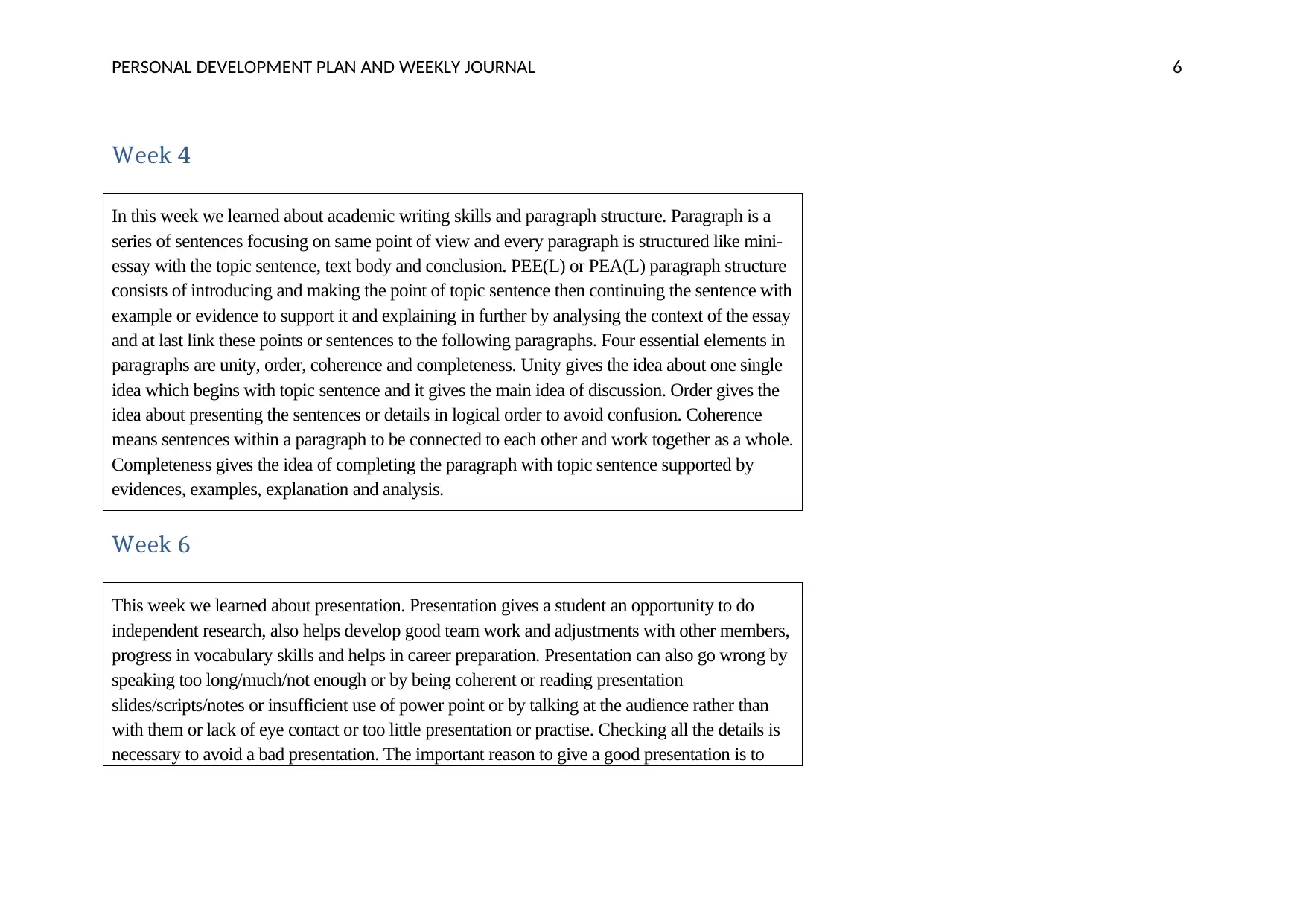
PERSONAL DEVELOPMENT PLAN AND WEEKLY JOURNAL 6
Week 4
In this week we learned about academic writing skills and paragraph structure. Paragraph is a
series of sentences focusing on same point of view and every paragraph is structured like mini-
essay with the topic sentence, text body and conclusion. PEE(L) or PEA(L) paragraph structure
consists of introducing and making the point of topic sentence then continuing the sentence with
example or evidence to support it and explaining in further by analysing the context of the essay
and at last link these points or sentences to the following paragraphs. Four essential elements in
paragraphs are unity, order, coherence and completeness. Unity gives the idea about one single
idea which begins with topic sentence and it gives the main idea of discussion. Order gives the
idea about presenting the sentences or details in logical order to avoid confusion. Coherence
means sentences within a paragraph to be connected to each other and work together as a whole.
Completeness gives the idea of completing the paragraph with topic sentence supported by
evidences, examples, explanation and analysis.
Week 6
This week we learned about presentation. Presentation gives a student an opportunity to do
independent research, also helps develop good team work and adjustments with other members,
progress in vocabulary skills and helps in career preparation. Presentation can also go wrong by
speaking too long/much/not enough or by being coherent or reading presentation
slides/scripts/notes or insufficient use of power point or by talking at the audience rather than
with them or lack of eye contact or too little presentation or practise. Checking all the details is
necessary to avoid a bad presentation. The important reason to give a good presentation is to
Week 4
In this week we learned about academic writing skills and paragraph structure. Paragraph is a
series of sentences focusing on same point of view and every paragraph is structured like mini-
essay with the topic sentence, text body and conclusion. PEE(L) or PEA(L) paragraph structure
consists of introducing and making the point of topic sentence then continuing the sentence with
example or evidence to support it and explaining in further by analysing the context of the essay
and at last link these points or sentences to the following paragraphs. Four essential elements in
paragraphs are unity, order, coherence and completeness. Unity gives the idea about one single
idea which begins with topic sentence and it gives the main idea of discussion. Order gives the
idea about presenting the sentences or details in logical order to avoid confusion. Coherence
means sentences within a paragraph to be connected to each other and work together as a whole.
Completeness gives the idea of completing the paragraph with topic sentence supported by
evidences, examples, explanation and analysis.
Week 6
This week we learned about presentation. Presentation gives a student an opportunity to do
independent research, also helps develop good team work and adjustments with other members,
progress in vocabulary skills and helps in career preparation. Presentation can also go wrong by
speaking too long/much/not enough or by being coherent or reading presentation
slides/scripts/notes or insufficient use of power point or by talking at the audience rather than
with them or lack of eye contact or too little presentation or practise. Checking all the details is
necessary to avoid a bad presentation. The important reason to give a good presentation is to
Paraphrase This Document
Need a fresh take? Get an instant paraphrase of this document with our AI Paraphraser
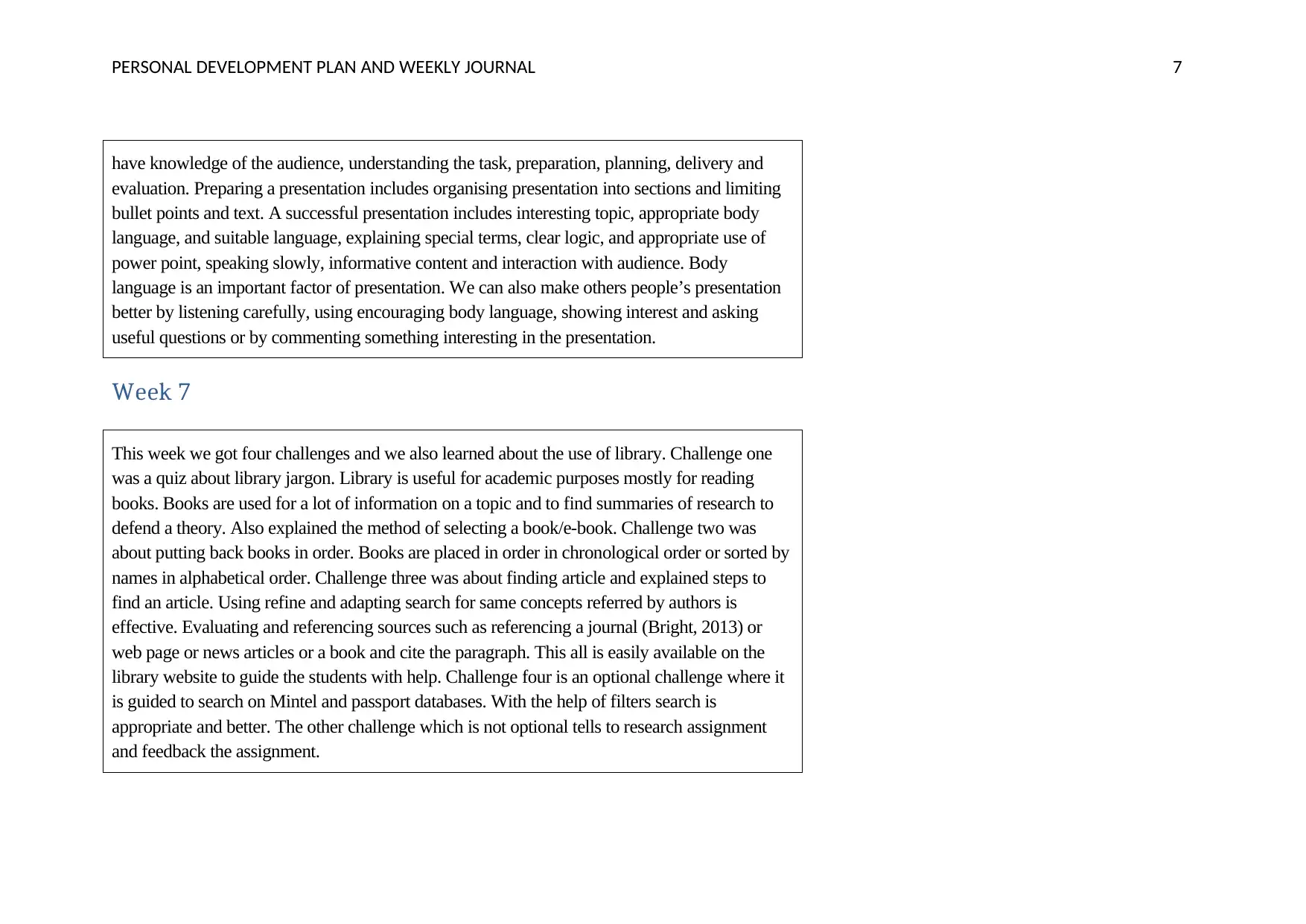
PERSONAL DEVELOPMENT PLAN AND WEEKLY JOURNAL 7
have knowledge of the audience, understanding the task, preparation, planning, delivery and
evaluation. Preparing a presentation includes organising presentation into sections and limiting
bullet points and text. A successful presentation includes interesting topic, appropriate body
language, and suitable language, explaining special terms, clear logic, and appropriate use of
power point, speaking slowly, informative content and interaction with audience. Body
language is an important factor of presentation. We can also make others people’s presentation
better by listening carefully, using encouraging body language, showing interest and asking
useful questions or by commenting something interesting in the presentation.
Week 7
This week we got four challenges and we also learned about the use of library. Challenge one
was a quiz about library jargon. Library is useful for academic purposes mostly for reading
books. Books are used for a lot of information on a topic and to find summaries of research to
defend a theory. Also explained the method of selecting a book/e-book. Challenge two was
about putting back books in order. Books are placed in order in chronological order or sorted by
names in alphabetical order. Challenge three was about finding article and explained steps to
find an article. Using refine and adapting search for same concepts referred by authors is
effective. Evaluating and referencing sources such as referencing a journal (Bright, 2013) or
web page or news articles or a book and cite the paragraph. This all is easily available on the
library website to guide the students with help. Challenge four is an optional challenge where it
is guided to search on Mintel and passport databases. With the help of filters search is
appropriate and better. The other challenge which is not optional tells to research assignment
and feedback the assignment.
have knowledge of the audience, understanding the task, preparation, planning, delivery and
evaluation. Preparing a presentation includes organising presentation into sections and limiting
bullet points and text. A successful presentation includes interesting topic, appropriate body
language, and suitable language, explaining special terms, clear logic, and appropriate use of
power point, speaking slowly, informative content and interaction with audience. Body
language is an important factor of presentation. We can also make others people’s presentation
better by listening carefully, using encouraging body language, showing interest and asking
useful questions or by commenting something interesting in the presentation.
Week 7
This week we got four challenges and we also learned about the use of library. Challenge one
was a quiz about library jargon. Library is useful for academic purposes mostly for reading
books. Books are used for a lot of information on a topic and to find summaries of research to
defend a theory. Also explained the method of selecting a book/e-book. Challenge two was
about putting back books in order. Books are placed in order in chronological order or sorted by
names in alphabetical order. Challenge three was about finding article and explained steps to
find an article. Using refine and adapting search for same concepts referred by authors is
effective. Evaluating and referencing sources such as referencing a journal (Bright, 2013) or
web page or news articles or a book and cite the paragraph. This all is easily available on the
library website to guide the students with help. Challenge four is an optional challenge where it
is guided to search on Mintel and passport databases. With the help of filters search is
appropriate and better. The other challenge which is not optional tells to research assignment
and feedback the assignment.
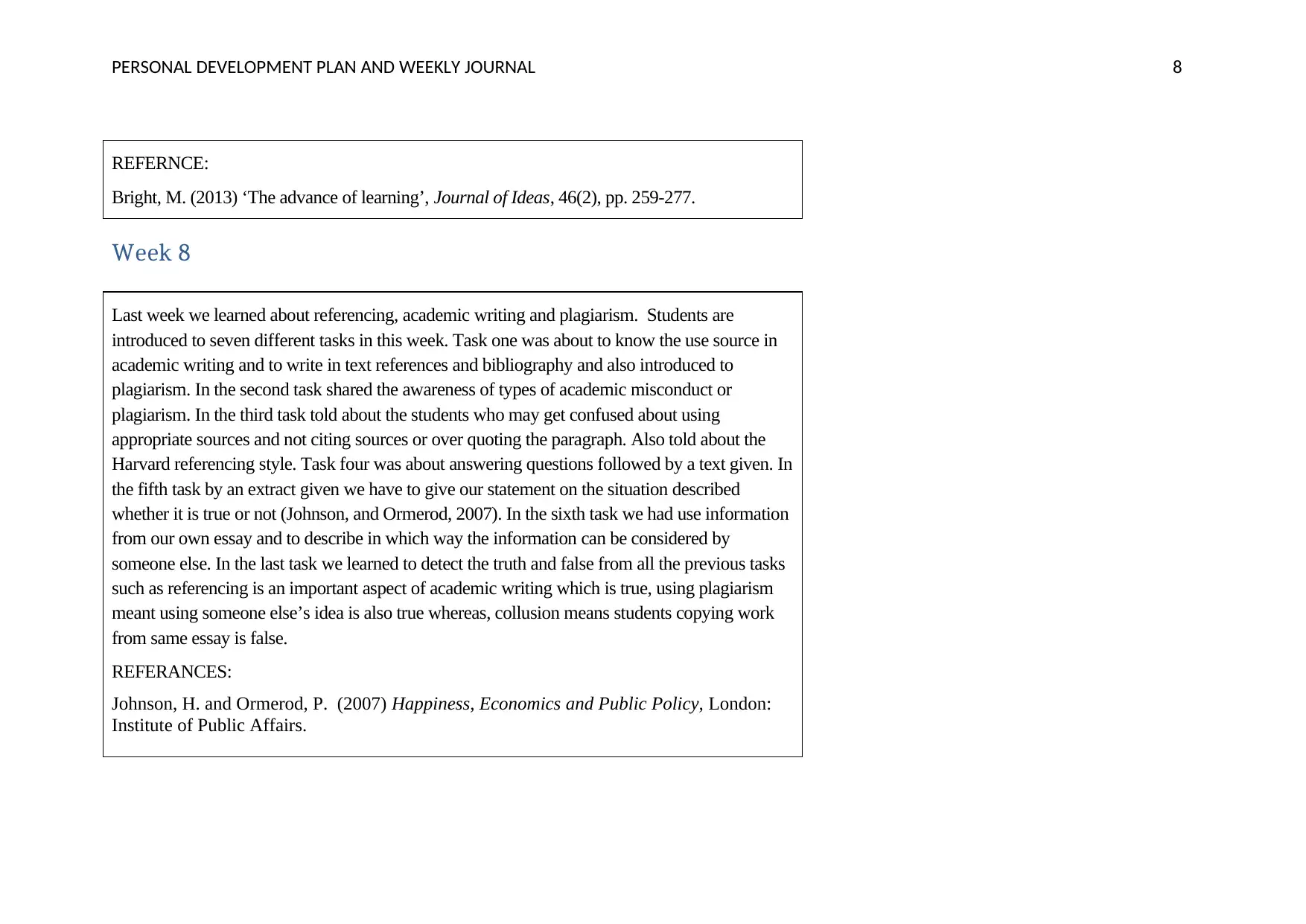
PERSONAL DEVELOPMENT PLAN AND WEEKLY JOURNAL 8
REFERNCE:
Bright, M. (2013) ‘The advance of learning’, Journal of Ideas, 46(2), pp. 259-277.
Week 8
Last week we learned about referencing, academic writing and plagiarism. Students are
introduced to seven different tasks in this week. Task one was about to know the use source in
academic writing and to write in text references and bibliography and also introduced to
plagiarism. In the second task shared the awareness of types of academic misconduct or
plagiarism. In the third task told about the students who may get confused about using
appropriate sources and not citing sources or over quoting the paragraph. Also told about the
Harvard referencing style. Task four was about answering questions followed by a text given. In
the fifth task by an extract given we have to give our statement on the situation described
whether it is true or not (Johnson, and Ormerod, 2007). In the sixth task we had use information
from our own essay and to describe in which way the information can be considered by
someone else. In the last task we learned to detect the truth and false from all the previous tasks
such as referencing is an important aspect of academic writing which is true, using plagiarism
meant using someone else’s idea is also true whereas, collusion means students copying work
from same essay is false.
REFERANCES:
Johnson, H. and Ormerod, P. (2007) Happiness, Economics and Public Policy, London:
Institute of Public Affairs.
REFERNCE:
Bright, M. (2013) ‘The advance of learning’, Journal of Ideas, 46(2), pp. 259-277.
Week 8
Last week we learned about referencing, academic writing and plagiarism. Students are
introduced to seven different tasks in this week. Task one was about to know the use source in
academic writing and to write in text references and bibliography and also introduced to
plagiarism. In the second task shared the awareness of types of academic misconduct or
plagiarism. In the third task told about the students who may get confused about using
appropriate sources and not citing sources or over quoting the paragraph. Also told about the
Harvard referencing style. Task four was about answering questions followed by a text given. In
the fifth task by an extract given we have to give our statement on the situation described
whether it is true or not (Johnson, and Ormerod, 2007). In the sixth task we had use information
from our own essay and to describe in which way the information can be considered by
someone else. In the last task we learned to detect the truth and false from all the previous tasks
such as referencing is an important aspect of academic writing which is true, using plagiarism
meant using someone else’s idea is also true whereas, collusion means students copying work
from same essay is false.
REFERANCES:
Johnson, H. and Ormerod, P. (2007) Happiness, Economics and Public Policy, London:
Institute of Public Affairs.
⊘ This is a preview!⊘
Do you want full access?
Subscribe today to unlock all pages.

Trusted by 1+ million students worldwide
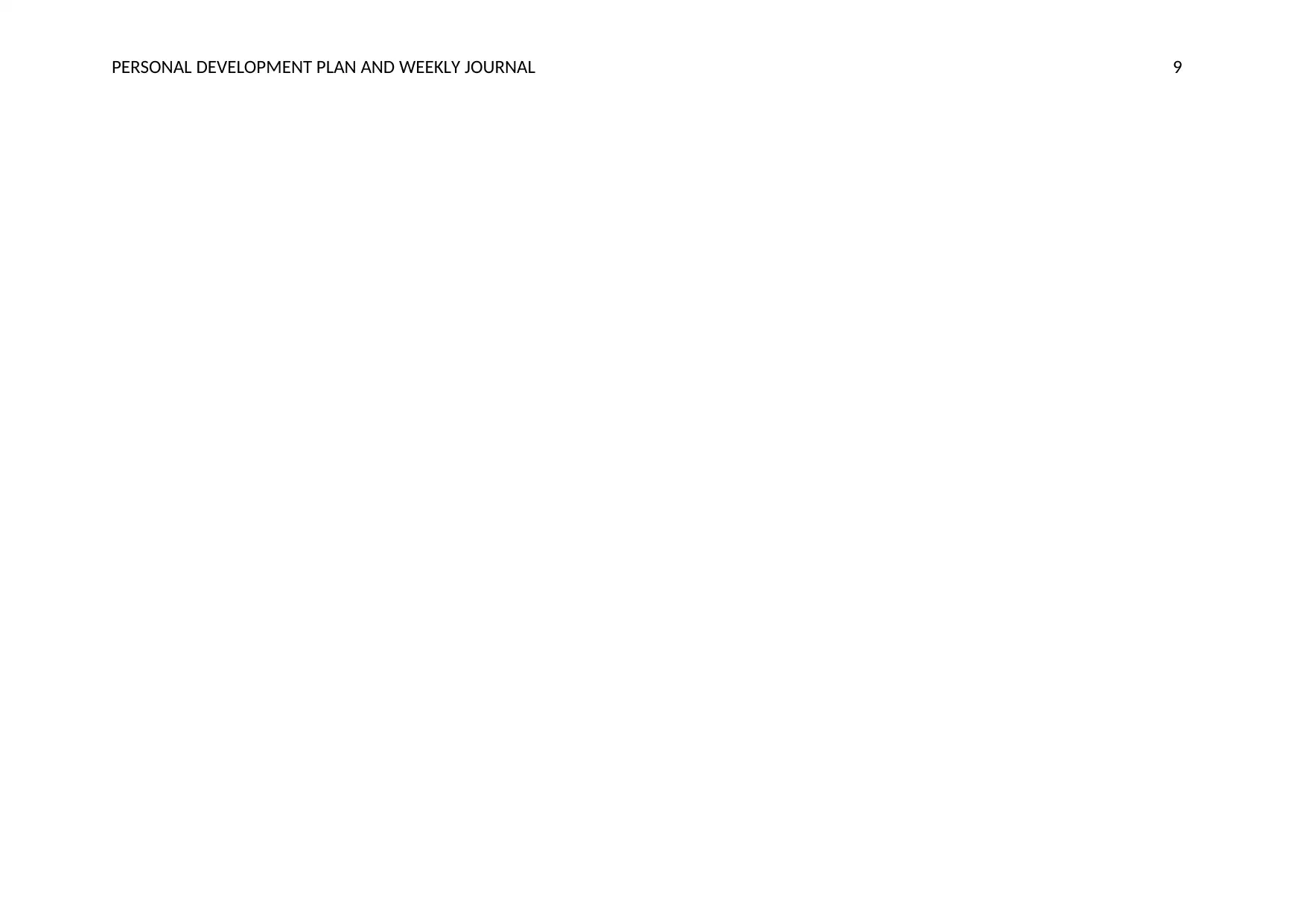
PERSONAL DEVELOPMENT PLAN AND WEEKLY JOURNAL 9
1 out of 10
Related Documents
Your All-in-One AI-Powered Toolkit for Academic Success.
+13062052269
info@desklib.com
Available 24*7 on WhatsApp / Email
![[object Object]](/_next/static/media/star-bottom.7253800d.svg)
Unlock your academic potential
Copyright © 2020–2026 A2Z Services. All Rights Reserved. Developed and managed by ZUCOL.


